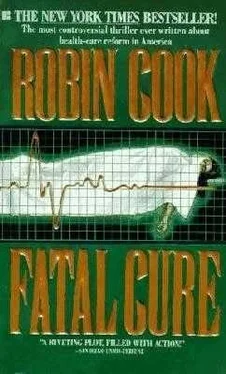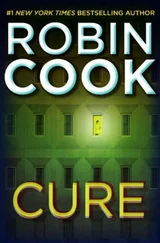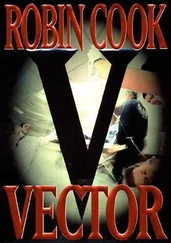"I'm going to medical records," David said. "And maybe I'll visit Dr. Holster. Hodges might have said something to him about his suspicions regarding his patients."
"Okay," Calhoun said agreeably. "I'll go do my thing, you go ahead and do yours. How's about if I come back later so we can compare notes?"
"Sounds good," David said. He looked over at Angela.
"It's fine by me," she said. "What about having dinner together?"
"I never turn down dinner invitations," Calhoun said.
"Then be here by seven," Angela said.
After Calhoun left, David got the shotgun and proceeded to load it with as many shells as it would hold. He leaned it against the newel post in the front hall.
"Have you changed your mind about the gun?" Angela asked.
"Let's just say I'm glad it's here," David said. "Have you talked to Nikki about it?"
"Absolutely," Angela said. "She even shot it. She said it hurt her shoulder."
"Don't let anyone in the house while I'm gone," David said. "And keep all the doors locked."
"Hey, I'm the one who wanted the doors locked," Angela said. "Remember?"
David took his bike. He didn't want to leave Angela without a car. He rode quickly, oblivious to the sights. His mind kept going over the idea of someone having killed his patients. It horrified and infuriated him. But as Calhoun said, he didn't have any proof.
When David arrived at the hospital, the day shift was being replaced by the evening shift. There was a lot of commotion and traffic. No one paid the slightest attention to David as he made his way to medical records.
Sitting down at a terminal, David set out Calhoun's copies of the pages that had been interred with Hodges. He'd held onto them since their visit to Clara Hodges. He called up each patient's name and read the history. All eight had had serious terminal illnesses as Clara Hodges had said.
Then David read through the notes written during each patient's hospital stay when they died. In all cases, the symptoms were similar to those experienced by David's patients: neurological symptoms, gastrointestinal symptoms, and symptoms dealing with the blood or immune system.
Next, David looked up the final causes of death. In each case except for one, death resulted from a combination of overwhelming pneumonia, sepsis, and shock. The exception was a death subsequent to a series of sustained seizures.
Putting Hodges' papers away, David began using the hospital computer to calculate yearly death rates as a percentage of admissions. The results flashed on the screen instantly. He quickly discovered that the death rate had changed two years before when it had gone from an average of 2.8% up to 6.7%. The last year the figures were available, the death rate was up to 8.1%.
David then narrowed the death rate to those patients who had a diagnosis of cancer, whether the cancer was attributed as the cause of death or not. Although these percentages were understandably higher than the overall death rate, they showed the same sudden increase.
David next used the computer to calculate the yearly diagnosis of cancer as a percentage of admissions. With these statistics he saw no sudden change. On average, they were nearly identical going back ten years.
The increased percentage of deaths seemed to back up David's theory of an angel of mercy at work. Euthanasia would explain the fact that the relative incidence of all cancers was remaining stable while the death rate for people with cancer was going up. The evidence was indirect, but it couldn't be ignored.
David was about to leave when he thought of using the computer to elicit additional information. He asked the computer to search through all the medical histories on all the admissions for the words "tattoo" or "dyschromia," the medical word for aberrant pigmentation.
He waited while the computer searched. David sat back and watched the screen. It took almost a minute, but finally a list blazed on the screen. David quickly deleted the cases with medical or metabolic causes of pigmentary change. In the end, he came up with a list of twenty people who had been treated at the hospital with a mention of a tattoo in their records.
Using the computer yet again to match name and employment, David discovered that five of the people listed worked in the hospital. They were, in alphabetical order, Clyde Devonshire, an RN who worked in the emergency room; Joe Forbs from security; Claudette Maurice from dietary; Werner Van Slyke from engineering/maintenance; and Peter Ullhof, a lab technician.
David was intrigued to see a couple of the other names and occupations listed: Carl Hobson, deputy policeman, and Steve Shegwick, a member of the security force at Bartlet College. The rest of the people worked in various stores or in construction.
David printed out a copy of this information. Then he went on his way.
David had assumed his visit to medical records had gone unnoticed, but he was wrong. Hortense Marshall, one of the health information professionals, had been alerted to some of David's activities by a security program she'd placed in the hospital computer.
From the moment she'd been alerted, she'd kept an eye on David. As soon as he'd departed from records, she placed a call to Helen Beaton.
"Dr. David Wilson was in medical records," Hortense said. "He's just left. But while he was here he called up information concerning hospital death rates."
"Did he talk with you?" Beaton asked.
"No," Hortense said. "He used one of our terminals. He didn't speak with anyone."
"How did you know he was accessing data on death rates?" Beaton asked.
"The computer alerted me," Hortense said. "After you advised me to report anyone requesting that kind of data, I had the computer programmed to signal me if someone tried to access the information on their own."
"Excellent work," Beaton said. "I like your initiative. You're to be commended. That kind of data is not for public consumption. We know our rates have gone up since we've become a tertiary care facility for CMV. They're sending us a high proportion of critically ill patients."
"I'm sure statistics of that ilk would not help our public relations," Hortense said.
"That's the concern," Beaton said.
"Should I have said anything to Dr. Wilson?" Hortense asked.
"No, you did fine," Beaton said. "Did he research anything else?"
"He was here for quite a while," Hortense said. "But I have no idea what else he was looking up."
"The reason I ask," Beaton said, "is because Dr. Wilson has been suspended from CMV."
"That I wasn't aware of," Hortense said.
"It just happened yesterday," Beaton said. "Would you let me know if he comes back?"
"Most certainly," Hortense said.
"Excuse me," Calhoun said. "Is your name Carl Hobson?" He'd approached one of Bartlet's uniformed patrolmen as he came out of the diner on Main Street.
"Sure is," the policeman answered.
"Mine's Phil Calhoun," Calhoun said.
"I've seen you around the station," Carl said. "You're friends with the chief."
"Yup," Calhoun said. "Wayne and I go back a ways. I used to be a state policeman, but I got retired."
"Good for you," Carl said. "Now it's nothing but fishing and hunting."
"I suppose," Calhoun said. "Mind if I ask you a personal question?"
"Hell, no," Carl said with curiosity.
"Carleton over at the Iron Horse told me you had a tattoo," Calhoun said. "I've been thinking about getting one myself so I've been looking around and asking questions. Many people in town have 'em?"
"There's a few," Carl said.
"When did you get yours?" Calhoun asked.
"Way the hell back in high school," Carl said with an embarrassed laugh. "Five of us drove over to Portsmouth, New Hampshire, one Friday night when we were seniors. There's a bunch of tattoo parlors over there. We were all blitzed."
Читать дальше












